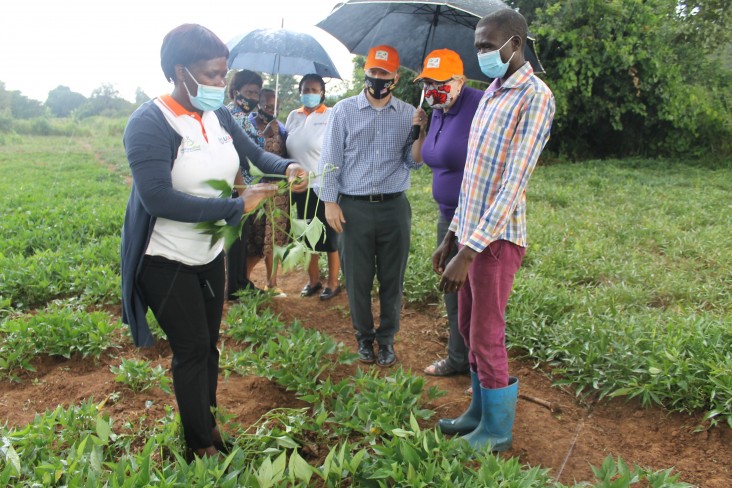Speeches Shim

Twenty-seven-year-old Morris Ojok is an enterprising young man from Akalo village in Lira district. After graduating with an Agricultural certificate from Kaberamaido Technical Institute, Ojok needed a job to earn an income. Sadly, in his village, just like many other rural communities, there were few possibilities to obtain formal employment.
But with Ojok’s determination, open mind, and hard work, staying unemployed was not an option. He decided to venture into agriculture because he believed there was enormous potential. He started growing orange sweet potatoes and ultimately became a successful agricultural entrepreneur in his community.
“I have loved agriculture since I was in primary school. I used to grow vegetables and sell them, although I was still very young. So, when I completed my certificate course, I decided to create my own job through agriculture,” Ojok says.
Ojok learned about the orange sweet potatoes in 2017 while listening to a local radio program sponsored by HarvestPlus’s Meals for Nutrition in Uganda (MENU), a USAID Feed the Future funded activity that improves household nutrition and livelihoods through production, consumption, and commercialization of bio-fortified vitamin A enriched sweet potatoes.
Although the orange sweet potato was introduced in Uganda to address vitamin A deficiency, Ojok found commercial benefits beyond the sweet potato root itself. He received training through MENU and has since become an orange sweet potato vine multiplier, supplying vines to farmers in his community and other organizations.
“My initial capital was 200,000 shillings (US$ 54 ) for ten bags of vines, which I planted on half an acre of land that I leased in 2017. Today, my capital has grown to six million shillings, and I am leasing four acres of land dealing in the same crop. Leasing land costs me 150,000 shillings per acre per year,” Ojok says. With income from his growing vine multiplication business, Ojok has built iron-roofed houses for himself and his parents. Previously they lived in grass-thatched huts.
Like any other business, Ojok’s farming business faces challenges. During the dry season there is drought, and stray cattle and goats from the neighborhood often graze on the potato vines, causing some losses. He also finds changing people’s attitude towards the orange sweet potato a challenge because it is a new food product for many Ugandans.
Moving forward, Ojok plans to invest in a solar-powered irrigation system to assist during the dry season. He also plans to fence off his farms with barbed wire to keep animals from grazing on his farm. Ojok is applying his learning to help others. He has teamed up with youth in his community to form the Akalo Youth Cooperative group, with a focus on agro-processing of the orange sweet potato. “I’m now working with 200 youth here in Akalo. We want to buy a machine that can make flour from the orange sweet potato so that we can make chapati, mandazi (local pastries), and other products,” Ojok explains. Ojok wishes to visit other large-scale farmers so that he can learn and improve his farming business.
In Uganda, agriculture plays a critical role in providing employment opportunities to youth. But the potential of the agricultural sector to create gainful employment has yet to be fully harnessed. Through the USAID MENU activity, which works to improve household nutrition and agricultural livelihoods, youth like Ojok are proving that farming can present great opportunities for gainful employment to earn a decent living.

Comment
Make a general inquiry or suggest an improvement.